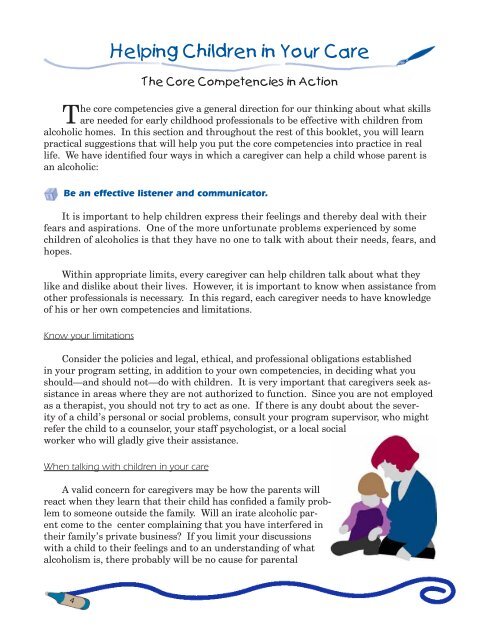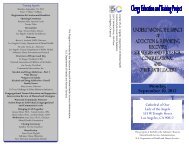Contents - NACoA
Contents - NACoA
Contents - NACoA
Create successful ePaper yourself
Turn your PDF publications into a flip-book with our unique Google optimized e-Paper software.
Helping Children in Your Care<br />
The Core Competencies in Action<br />
The core competencies give a general direction for our thinking about what skills<br />
are needed for early childhood professionals to be effective with children from<br />
alcoholic homes. In this section and throughout the rest of this booklet, you will learn<br />
practical suggestions that will help you put the core competencies into practice in real<br />
life. We have identified four ways in which a caregiver can help a child whose parent is<br />
an alcoholic:<br />
Be an effective listener and communicator.<br />
It is important to help children express their feelings and thereby deal with their<br />
fears and aspirations. One of the more unfortunate problems experienced by some<br />
children of alcoholics is that they have no one to talk with about their needs, fears, and<br />
hopes.<br />
Within appropriate limits, every caregiver can help children talk about what they<br />
like and dislike about their lives. However, it is important to know when assistance from<br />
other professionals is necessary. In this regard, each caregiver needs to have knowledge<br />
of his or her own competencies and limitations.<br />
Know your limitations<br />
Consider the policies and legal, ethical, and professional obligations established<br />
in your program setting, in addition to your own competencies, in deciding what you<br />
should—and should not—do with children. It is very important that caregivers seek assistance<br />
in areas where they are not authorized to function. Since you are not employed<br />
as a therapist, you should not try to act as one. If there is any doubt about the severity<br />
of a child’s personal or social problems, consult your program supervisor, who might<br />
refer the child to a counselor, your staff psychologist, or a local social<br />
worker who will gladly give their assistance.<br />
When talking with children in your care<br />
A valid concern for caregivers may be how the parents will<br />
react when they learn that their child has confided a family problem<br />
to someone outside the family. Will an irate alcoholic parent<br />
come to the center complaining that you have interfered in<br />
their family’s private business? If you limit your discussions<br />
with a child to their feelings and to an understanding of what<br />
alcoholism is, there probably will be no cause for parental





